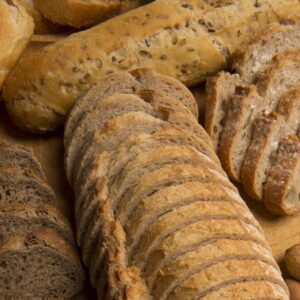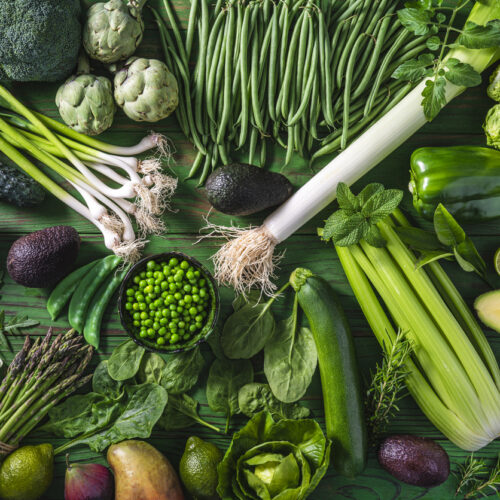
Vegetarianism is a way of life for many, and it also makes sense for non-vegetarians to eat less meat – both for the sake of their health and the environment.
Eating a vegetarian diet is easy, with so many blogs, cookbooks and products to inspire us. Health experts encourage us to make veges, fruit and grains the basis of most meals and to cut back on red and processed meat. And there’s now a push, too, to get us to eat more beans and pulses.
Know your nutrients
One of the main concerns for would-be vegetarians is that they’ll miss out on nutrients. But with a little know-how and meal planning, you can easily meet most of your daily needs from plant-based foods alone. Omega-3 fats and vitamin B12 are the exceptions, and iron can be problematic for some women.
Essential nutrients
Iron
- Important for: Making red blood cells and haemoglobin, and transporting oxygen around the body — low iron can result in fatigue and low immunity.
- Recommended daily intake: 8mg for men and for women over 50; 18mg for younger women.
- Top vegetarian sources: Eggs, beans, lentils, nuts, seeds, fortified cereals and dark green leafy vegetables such as spinach.
Calcium
- Important for: Building and maintaining strong bones and teeth, normal muscle function, releasing energy from food, and blood clotting.
- Recommended daily intake: 1000mg for women up to 50 years and men up to 70; 1300mg for women over 50 and men over 70.
- Top vegetarian sources: Dairy products such as milk, cheese and yoghurt (at least two servings of reduced-fat dairy are recommended to help meet our needs). Other sources include fortified soy products and dairy alternatives, beans, lentils, nuts and seeds, green leafy veges and dried fruit such as apricots.
Vitamin B12
- Important for: Helping to produce energy in the body and making red blood cells. It also supports the immune and nervous systems.
- Recommended daily intake: 2.4mcg.
- Top vegetarian sources: Vitamin B12 is found naturally only in animal foods, such as eggs, milk, cheese and yoghurt. Soy products and milk alternatives are often fortified with vitamin B12, as are many breakfast cereals. If you’re vegan, consider taking a supplement.
Selenium
- Important for: Helping to prevent cell damage by working with vitamin E to fight harmful free radicals. It’s also important for a healthy immune system, fertility, thyroid metabolism and regulating blood pressure.
- Recommended daily intake: 60mcg (women), 70mcg (men).
- Top vegetarian sources: Brazil nuts, walnuts, cashews, eggs, mushrooms and whole grains.
Omega-3 fats
- Important for: Helping to keep the heart working normally, and maintaining normal blood pressure and reducing triglycerides (a type of blood fat). They’re also important for normal brain function and eyesight.
- Recommended daily intake: The suggested dietary target for long-chain omega-3 (from fish) is 430mg for women and 610mg for men. Two servings of oily fish each week are recommended.
- Top vegetarian sources: Flaxseed, canola and soy oils, walnuts and flax seeds are good sources of short-chain omega-3 fat. But, the conversion of short-chain omega-3 in vegetarian sources into long-chain omega-3s isn’t very efficient, so people on a fully vegetarian diet may want to consider a supplement.
Protein
Plant-based protein
Use these hero products to get your muscle-building protein.
- Quorn fungi are used to make high-protein ‘mycoprotein’, which is flavoured and processed into meat-style Quorn products. The ‘chicken’ pieces and mince have the lowest calorie and highest protein contents, but the sausages, steaks and burgers all make healthy fast-food alternatives. But do keep an eye on the salt content.
- Soy milk, tofu (firm and silken) and soy mince are a few of the many things the soy bean can be transformed into. It’s also delicious eaten whole (also known as edamame). Silken tofu can be used to make sauces and dips, while the firm variety is perfect for stir-fries, grills and curries. Add soy mince to lasagne or chilli, and use soy milk as you would dairy in drinks and porridge (just make sure it’s calcium fortified and unsweetened).
- Nuts and nut butters provide good fats, protein and a host of vitamins and minerals. Stick to a small handful (about 30g) or a heaped tablespoon of sugar- and salt-free nut butter to keep calories down.
Smart protein sources
Use this handy checklist to help get your protein…
- Vegie Delights casserole mince (138g serve) 20.4g
- Anchor Greek-style yoghurt (1/2 cup/130g) 10.8g
- 2 eggs 13.5g
- Quorn mince (100g) 14.9g
- Firm-style tofu (150g) 20.3g
- Red lentils (1/4 cup dried) 11.4g
- Quinoa (1/2 cup uncooked) 11.9g
- Chickpeas in spring water (1/2 x 400g can) 10g
- Reduced-fat cheddar (30g) 9.2g
- Red kidney beans (1/2 x 400g can) 9.7g
- Trim milk (200ml) 8g
- Almonds (30g) 6.3g
- Sunflower seeds (2 tablespoons) 3.9g
Five best buys for your fridge or freezer
1 . Frozen soy beans
Mamasan Edamame soy beans (immature soy beans), $3.59/400g, widely available
Vibrant, green and crunchy — add to grain or bean salads for extra colour and protein. Or whiz thawed beans with a little tahini and lime juice for a tasty dip or sandwich spread.
2. Frozen peas
Wattie’s Frozen Garden Peas, $3.79/1kg, widely available
There are very few dishes peas can’t improve – they’re so versatile! And with around 5g of protein per 100g, they can make a big difference to your protein (as well as your five-a-day) intake.
3. Meat-free mince
Quorn Frozen Meal Meat & Soy Free Mince, $8.99/300g, from Countdown, New World and Pak‘nSave supermarkets
The texture and flavour make this ideal for replacing meat in classic mince dishes such as lasagne, chilli, bolognese and cottage pie.
4. Tempeh
Tonzu Tempeh organic, $6.29/250g, widely available
This fermented soy bean cake is loaded with protein and minerals. Bake with a spicy marinade before tossing into salads or stuffing into pitas.
5. Vegetarian sausages
Bean Supreme Vegetarian Sausages, Rosemary, Sage & Parsley, $7.99/375g, widely available
You can’t beat vegetarian bangers and mash for comfort food. And cram in more of your five-a-day by swapping spuds for a butter bean and cauliflower mash.
Store cupboard essentials
Quinoa
Ceres Organics Quinoa, $9.99/400g, from Countdown
Quinoa contains all the essential amino acids and provides protein and carbs in good quantities. Buy dried to cook from scratch or in ready-to-heat pouches for when time is short. Use instead of rice or pasta, or add to soups and salads.
Canned beans
Select Cannellini Beans, no added salt, $1.30/420g, from Countdown
It pays to keep a few cans of beans to hand – they’re so diverse. Go for those canned in water without added salt. As well as using them to make go-to bean salads and chilli, you can whiz them into burgers, dips and hummus.
Eggs
Eggs, dozen, $3.25, widely available
The ultimate protein-rich fast food that’s also packed with nutrients such as zinc and folate. Boil, scramble, whisk into omelettes or use to make fritters with leftover veges.
Lentils
Ceres Organics dried organic brown lentils, $6.25/500g, some supermarkets and health stores
Mix canned brown lentils with lemon zest, garlic, chilli and olive oil for a quick salad, or throw them into soups and stews. Dried lentils cook quickly and, unlike most pulses, don’t require soaking beforehand.
Flavour-boosting tips
Chargrill vegetables
Time to heat up the non-stick griddle pan or fire up the barbie… Chargrilling veges, such as peppers, courgettes and spring onions, caramelises the natural sugars for a richer flavour. The grill lines look appetising, too.
Team tofu with ginger
Tofu needs just a little TLC to make it delicious. Blot firm tofu on kitchen paper, then rub in a little cornflour and ground ginger, five-spice or chilli. Cut into chunks, then fry in a little toasted sesame oil, turning only when a golden crust has formed.
Mushrooms
So often overlooked, mushrooms in any guise are vitamin powerhouses and full of umami flavour. Stuff large, flat mushrooms with breadcrumbs, herbs and reduced-fat strong cheese. Or finely chop smaller mushrooms in a food processor and use instead of mince to make a rich ragù or shepherd’s pie. Sliced raw mushrooms are great in salads, too, especially with a zingy dressing.
Spices
A pinch of something hot, peppery or aromatic can take a dish from bland to ‘wow!’ in seconds. You will need a good (but not exhaustive) collection of spices. Our favourites are: chilli flakes, which can be added to anything; garam masala for an Indian twist; nutmeg for sweet-savoury flavour; fennel seeds for adding depth to Mediterranean-style dishes; and ground coriander for gentle warmth.
www.healthyfood.com










